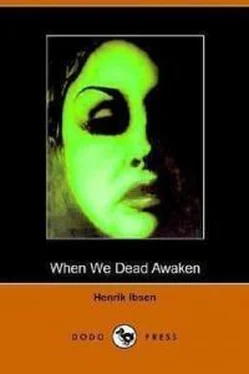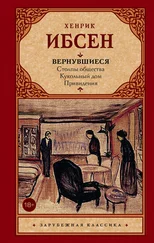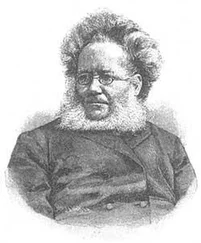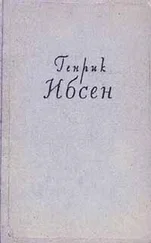Генрик Ибсен - When We Dead Awaken
Здесь есть возможность читать онлайн «Генрик Ибсен - When We Dead Awaken» весь текст электронной книги совершенно бесплатно (целиком полную версию без сокращений). В некоторых случаях можно слушать аудио, скачать через торрент в формате fb2 и присутствует краткое содержание. Год выпуска: 2014, Издательство: epubBooks Classics, Жанр: Драматургия, на английском языке. Описание произведения, (предисловие) а так же отзывы посетителей доступны на портале библиотеки ЛибКат.
- Название:When We Dead Awaken
- Автор:
- Издательство:epubBooks Classics
- Жанр:
- Год:2014
- ISBN:нет данных
- Рейтинг книги:3 / 5. Голосов: 1
-
Избранное:Добавить в избранное
- Отзывы:
-
Ваша оценка:
- 60
- 1
- 2
- 3
- 4
- 5
When We Dead Awaken: краткое содержание, описание и аннотация
Предлагаем к чтению аннотацию, описание, краткое содержание или предисловие (зависит от того, что написал сам автор книги «When We Dead Awaken»). Если вы не нашли необходимую информацию о книге — напишите в комментариях, мы постараемся отыскать её.
When We Dead Awaken — читать онлайн бесплатно полную книгу (весь текст) целиком
Ниже представлен текст книги, разбитый по страницам. Система сохранения места последней прочитанной страницы, позволяет с удобством читать онлайн бесплатно книгу «When We Dead Awaken», без необходимости каждый раз заново искать на чём Вы остановились. Поставьте закладку, и сможете в любой момент перейти на страницу, на которой закончили чтение.
Интервал:
Закладка:
When We Dead Awaken
Henrik Ibsen
Introduction
From Pillars of Society to John Gabriel Borkman , Ibsen's plays had followed each other at regular intervals of two years, save when his indignation over the abuse heaped upon Ghosts reduced to a single year the interval between that play and An Enemy of the People . John Gabriel Borkman having appeared in 1896, its successor was expected in 1898; but Christmas came and brought no rumour of a new play. In a man now over seventy, this breach of a long–established habit seemed ominous. The new National Theatre in Christiania was opened in September of the following year; and when I then met Ibsen (for the last time) he told me that he was actually at work on a new play, which he thought of calling a "Dramatic Epilogue." "He wrote When We Dead Awaken ," says Dr. Elias, "with such labour and such passionate agitation, so spasmodically and so feverishly, that those around him were almost alarmed. He must get on with it, he must get on! He seemed to hear the beating of dark pinions over his head. He seemed to feel the grim Visitant, who had accompanied Alfred Allmers on the mountain paths, already standing behind him with uplifted hand. His relatives are firmly convinced that he knew quite clearly that this would be his last play, that he was to write no more. And soon the blow fell."
When We Dead Awaken was published very shortly before Christmas 1899. He had still a year of comparative health before him. We find him in March 1900, writing to Count Prozor: "I cannot say yet whether or not I shall write another drama; but if I continue to retain the vigour of body and mind which I at present enjoy, I do not imagine that I shall be able to keep permanently away from the old battlefields. However, if I were to make my appearance again, it would be with new weapons and in new armour." Was he hinting at the desire, which he had long ago confessed to Professor Herford, that his last work should be a drama in verse? Whatever his dream, it was not to be realised. His last letter (defending his attitude of philosophic impartiality with regard to the South African war) is dated December 9, 1900. With the dawn of the new century, the curtain descended upon the mind of the great dramatic poet of the age which had passed away.
When We Dead Awaken was acted during 1900 at most of the leading theatres in Scandinavia and Germany. In some German cities (notably in Frankfort on Main) it even attained a considerable number of representatives. I cannot learn, however, that it has anywhere held the stage. It was produced in London, by the State Society, at the Imperial Theatre, on January 25 and 26, 1903. Mr. G. S. Titheradge played Rubek, Miss Henrietta Watson Irene, Miss Mabel Hackney Maia, and Mr. Laurence Irving Ulfheim. I find no record of any American performance.
In the above–mentioned letter to Count Prozor, Ibsen confirmed that critic's conjecture that "the series which ends with the Epilogue really began with The Master Builder ." As the last confession, so to speak, of a great artist, the Epilogue will always be read with interest. It contains, moreover, many flashes of the old genius, many strokes of the old incommunicable magic. One may say with perfect sincerity that there is more fascination in the dregs of Ibsen's mind than in the "first sprightly running" of more common–place talents. But to his sane admirers the interest of the play must always be melancholy, because it is purely pathological. To deny this is, in my opinion, to cast a slur over all the poet's previous work, and in great measure to justify the criticisms of his most violent detractors. For When We Dead Awaken is very like the sort of play that haunted the "anti–Ibsenite" imagination in the year 1893 or thereabouts. It is a piece of self–caricature, a series of echoes from all the earlier plays, an exaggeration of manner to the pitch of mannerism. Moreover, in his treatment of his symbolic motives, Ibsen did exactly what he had hitherto, with perfect justice, plumed himself upon never doing: he sacrificed the surface reality to the underlying meaning. Take, for instance, the history of Rubek's statue and its development into a group. In actual sculpture this development is a grotesque impossibility. In conceiving it we are deserting the domain of reality, and plunging into some fourth dimension where the properties of matter are other than those we know. This is an abandonment of the fundamental principle which Ibsen over and over again emphatically expressed—namely, that any symbolism his work might be found to contain was entirely incidental, and subordinate to the truth and consistency of his picture of life. Even when he dallied with the supernatural, as in The Master Builder and Little Eyolf , he was always careful, as I have tried to show, not to overstep decisively the boundaries of the natural. Here, on the other hand, without any suggestion of the supernatural, we are confronted with the wholly impossible, the inconceivable. How remote is this alike from his principles of art and from the consistent, unvarying practice of his better years! So great is the chasm between John Gabriel Borkman and When We Dead Awaken that one could almost suppose his mental breakdown to have preceded instead of followed the writing of the latter play. Certainly it is one of the premonitions of the coming end. It is Ibsen's Count Robert of Paris . To pretend to rank it with his masterpieces is to show a very imperfect sense of the nature of their mastery.
A Dramatic Epilogue
Characters
PROFESSOR ARNOLD RUBEK, a sculptor.
MRS. MAIA RUBEK, his wife.
THE INSPECTOR at the Baths.
ULFHEIM, a landed proprietor.
A STRANGER LADY.
A SISTER OF MERCY.
Servants, Visitors to the Baths, and Children.
The First Act passes at a bathing establishment on the coast; the Second and Third Acts in the neighbourhood of a health resort, high in the mountains.
Act First
[Outside the Bath Hotel. A portion of the main building can be seen to the right.
An open, park–like place with a fountain, groups of fine old trees, and shrubbery. To the left, a little pavilion almost covered with ivy and Virginia creeper. A table and chair outside it. At the back a view over the fjord, right out to sea, with headlands and small islands in the distance. It is a calm, warm and sunny summer morning.
[PROFESSOR RUBEK and MRS. MAIA RUBEK are sitting in basket chairs beside a covered table on the lawn outside the hotel, having just breakfasted. They have champagne and seltzer water on the table, and each has a newspaper. PROFESSOR RUBEK is an elderly man of distinguished appearance, wearing a black velvet jacket, and otherwise in light summer attire. MAIA is quite young, with a vivacious expression and lively, mocking eyes, yet with a suggestion of fatigue. She wears an elegant travelling dress.
MAIA.
[Sits for some time as though waiting for the PROFESSOR to say something, then lets her paper drop with a deep sigh.] Oh dear, dear, dear—!
PROFESSOR RUBEK.
[Looks up from his paper.] Well, Maia? What is the matter with you?
MAIA.
Just listen how silent it is here.
PROFESSOR RUBEK.
[Smiles indulgently.] And you can hear that?
MAIA.
What?
PROFESSOR RUBEK.
The silence?
MAIA.
Yes, indeed I can.
PROFESSOR RUBEK.
Well, perhaps you are right, mein Kind . One can really hear the silence.
MAIA.
Heaven knows you can—when it's so absolutely overpowering as it is here—
PROFESSOR RUBEK.
Here at the Baths, you mean?
Читать дальшеИнтервал:
Закладка:
Похожие книги на «When We Dead Awaken»
Представляем Вашему вниманию похожие книги на «When We Dead Awaken» списком для выбора. Мы отобрали схожую по названию и смыслу литературу в надежде предоставить читателям больше вариантов отыскать новые, интересные, ещё непрочитанные произведения.
Обсуждение, отзывы о книге «When We Dead Awaken» и просто собственные мнения читателей. Оставьте ваши комментарии, напишите, что Вы думаете о произведении, его смысле или главных героях. Укажите что конкретно понравилось, а что нет, и почему Вы так считаете.








